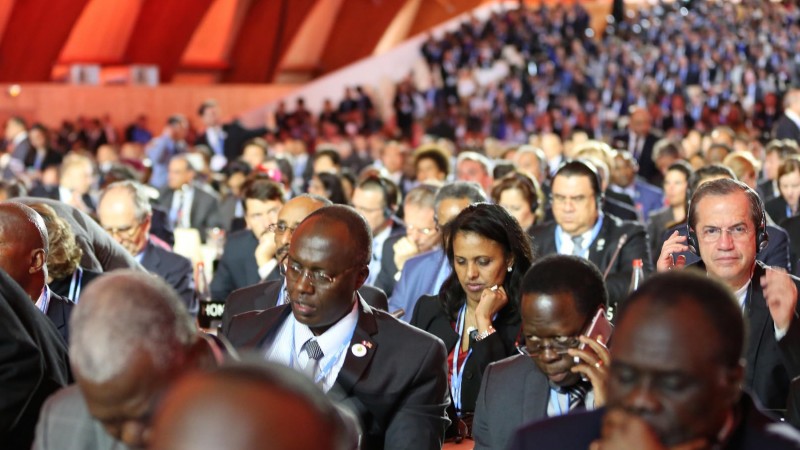Developing country diplomats may struggle to attend UN climate meetings unless funding for their travel is radically boosted.
That’s the warning in the UN climate body’s latest budget report, which reveals just $80,000 has so far been provided by donors, compared to well over $300,000 at the same point in 2014.
“Additional contributions will be required to fund participation of representatives from eligible Parties in 2016,” reads the report.
“As at 30 June 2016, EUR 14.4 million, or 54% of the total core budget indicative contributions expected for the year 2016, had been received,” reads another line.
Is a #UNFCCC $$ #COP22 bunfight on its way? Contribs for delegation participation fund down https://t.co/x9p2l9ZlML pic.twitter.com/6D1pDVZSxl
— Nick Chan (@nickdotchan) September 8, 2016
This compared to 77% [EUR 36.6 million] at the same point in 2015. A request for comment was sent to the UN climate body last Thursday.
Many developing countries rely on external funding to ensure they can send adequate numbers of diplomats to the annual UN climate summit, which this year takes place in Marrakech.
“Marrakech will be the first meeting where we move from negotiations to implementation, and the agreement may well have entered into force by then,” said Thoriq Ibrahim, minister of energy and environment for the Maldives and chair of the alliance of small island states.
“It remains absolutely critical that the international community continues to support this process so we can make it work for people on the ground before it’s too late.”
Pacific leadership?
Talking of small island states – they wrapped up a meeting of the Pacific Islands Leaders’ Forum held in Micronesia with a pledge to cooperate closely on “fight as one” on climate change.
“Along with our big brothers and sisters in Australia and New Zealand, we have declared that we will continue to push for an ambitious amendment to the Montreal Protocol in October, and to see ambitious climate action across all sectors,” said John Silk, Marshall Islands’ foreign minister.
“This must include reducing aviation and maritime emissions in line with the 1.5C temperature target we all agreed in Paris.”
Presumably this means the forum member the Cook Islands will drop its blocking moves at the International Maritime Organisation against a tougher climate standards for shipping?
Aliens (are not) coming
On the IMO… it’s about to seal a new environmental deal – 20 years after it was first suggested.
It’s focused on preventing invasive species “ravaging the oceans” reports the New Scientist.
“The convention will compel many of the world’s 70,000 or so registered cargo ships to install equipment guaranteed to kill off any aquatic creatures in seawater taken on board to maintain stability,” it reports.
Proposed in 1991, adopted in 2004, the deal is only coming online now after Finland signed up, breaking the 35% of global shipping benchmark needed for activation.
Leading shipping registry Panama has not signed up, nor has the US, which has its own – similar – regulations.
US to help Nigeria on climate
US climate envoy Jonathan Pershing says Washington will help Nigeria implement its climate plans – through funding, capacity building and technology assistance, reports ESI Africa.
“Quite a lot of resources have been provided by the US, including in the health, which connects back to climate; food security, which connects back to climate; technical assistance in the energy sector, which connects back to climate; and part of our multilateral process between climate funds, which is exclusively geared for countries around the world,” he said.
Oil and gas provides around 35% of Nigeria’s GDP, according to OPEC, making it a strategically important sector, but the sector is also a major source of the country’s emissions.
Brexit means what?
There’s a new team in town in London. Fresh from winning a referendum on the UK’s status in the EU, leading Leave campaigners have set up a new lobby group: Change Britain.
“We aim to build a broad coalition that brings together people from inside and outside politics, regardless of how they voted in the referendum, to get the job done,” says the new website.
Members include Lord Lawson, founder of the climate sceptic Global Warming Policy Foundation and, MPs Graham Brady, Dominic Raab and Graham Stringer who all “generally voted against measures to prevent climate change” according to analysts at TheyWorkForYou.
The green North?
Long ravaged by the exodus of jobs to emerging markets, Britain’s industrial heartlands are finding new life as the green economy drives growth in Lancashire, Yorkshire and Humberside.
That’s the interesting finding in a new report published by the Aldersgate Group, a coalition of green businesses. Siemens, Associated British Ports and DONG Energy are among those investing millions in the region.
It’s a long read but worth your time – and comes with six headline recommendations for Theresa May’s Brexit-focused government, including investment in low carbon skills and a new carbon capture and storage strategy.
“We are beginning to see the benefits of sustained investment in renewable energy in the North of England,” said Brent Cheshire, UK Country Chairman at DONG Energy.
“It is not only helping to regenerate communities which have lost their traditional industries, but building a robust supply chain and attracting international manufacturers to locate plants in the UK.”
